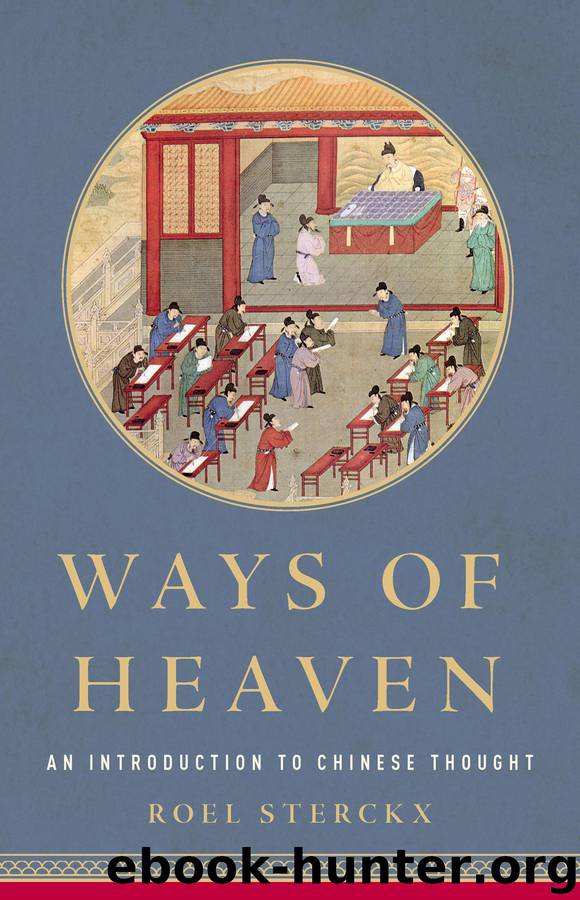Ways of Heaven by Roel Sterckx

Author:Roel Sterckx
Language: eng
Format: epub
Publisher: Basic Books
Published: 2019-09-16T16:00:00+00:00
How did ritual arise? I say that people are born with desires which, if not satisfied, cannot but lead people to seek to satisfy them. If in seeking to satisfy their desires people observe no measure, and apportion things without limits, it would be impossible for them not to fight over the means to satisfy their desires. Such contention leads to disorder. Disorder leads to poverty. (Xunzi 19.1a)
In Xunzi’s understanding, rituals are our second nature: they are the taught component that shapes our personality. Human nature requires pruning to be socially functional: ‘Rituals trim what is too long, stretch out what is too short, eliminate excess, and remedy deficiency’ (Xunzi 19.5b). Here he reiterates Confucius’s idea that rituals assist in two ways: they offer a minimal standard where such standards are lacking and they prevent excess. Without being mediated by a sense of propriety, potential positives in someone’s behaviour can appear off-putting: having to show respect to someone can wear you down; being careful can turn into anxiety; courage can appear as rowdiness; and candour can seem like rudeness (An. 8.2).
Like no other thinker before him, Xunzi politicizes the need for rituals. They are indispensable to the foundation of the state and the fountain of all authority: ‘Rites are the highest expression of order and discrimination, the root of the strength of the state, the Way by which the majestic sway of authority is created, and the focus of merit and fame’ (Xunzi 15.4). Neglecting the rites, then, is depriving society of its main engine for order: ‘a nation without ritual will not be tranquil’ (Xunzi 2.2). Xunzi goes a step further. He believes that ritual as a governing principle even transcends the human order: li is a cosmic force, a principle that orders Heaven and Earth, the planets, the seasons and the whole natural world: ‘Ritual has three roots: Heaven and Earth are the root of life; the ancestors are the root of one’s kin; ruler and teacher are the root of order… If just one of these three were missing, there would be no peace and security for man’ (Xunzi 19.2a). For Xunzi, ritual is as indispensable in the service of Heaven and Earth and one’s forebears as it is necessary to order human society in the here and now. Having turned ritual into a universal principle for order, and the rituals of the ancient kings into the absolute standard to be upheld, Xunzi’s notion of ritual sails closely to what Legalists held to be the purpose of the law. There is a difference, however: people can be compelled to follow the law when presented with the prospect of penalties, fines and punishments. By contrast, good manners and a sense of propriety need to develop from within. It cannot be forced upon people. A Confucian challenge to those who believe one can legislate for respect would be to argue that such attitudes can only be acquired through example, habit and constant practice and repetition.
Download
This site does not store any files on its server. We only index and link to content provided by other sites. Please contact the content providers to delete copyright contents if any and email us, we'll remove relevant links or contents immediately.
| Confucianism | Feng Shui |
| I Ching | Jainism |
| Karma | Shintoism |
| Sikhism | Tao Te Ching |
| Taoism | Tibetan Book of the Dead |
| Zoroastrianism |
The Tao of Physics by Fritjof Capra(2276)
Human Design by Chetan Parkyn(2075)
The Diamond Cutter by Geshe Michael Roach(2062)
Feng Shui by Stephen Skinner(1941)
The Alchemy of Sexual Energy by Mantak Chia(1860)
Tao Te Ching by Lao Tzu(1843)
365 Tao: Daily Meditations by Ming-Dao Deng(1624)
Tao Tantric Arts for Women by Minke de Vos(1600)
Sun Tzu's The Art of War by Giles Lionel Minford John Tzu Sun(1542)
Sidney Sheldon (1982) Master Of The Game by Sidney Sheldon(1520)
Buddhism 101 by Arnie Kozak(1514)
Karma-Yoga and Bhakti-Yoga by Swami Vivekananda(1496)
The Analects of Confucius by Burton Watson(1436)
The Art of War Other Classics of Eastern Philosophy by Sun Tzu Lao-Tzu Confucius Mencius(1428)
Tao te ching by Lao Tzu(1367)
The Way of Chuang Tzu by Thomas Merton(1365)
The New Bohemians Handbook by Justina Blakeney(1356)
The Sayings Of by Confucius(1317)
Bless This House by Donna Henes(1272)
